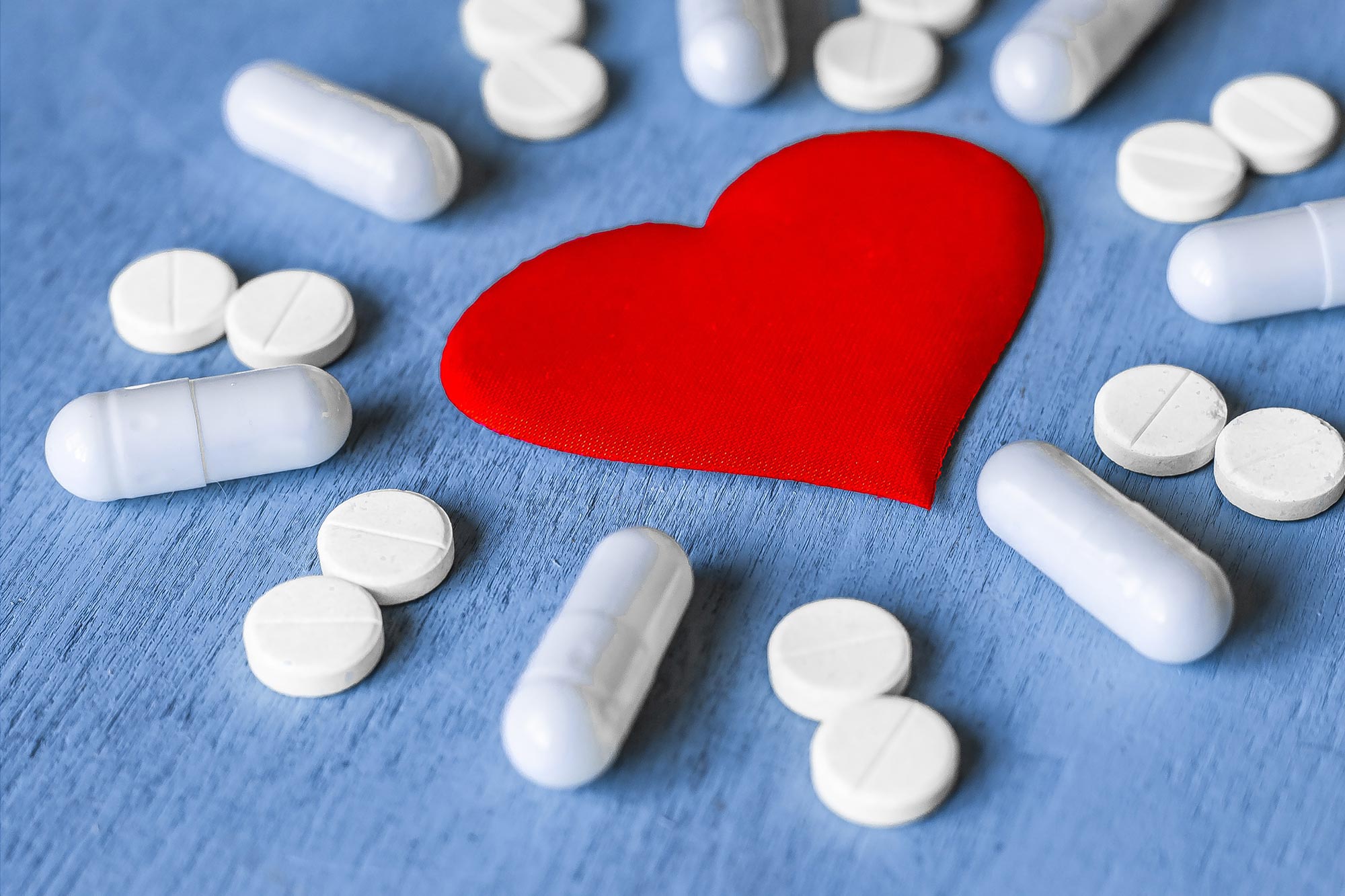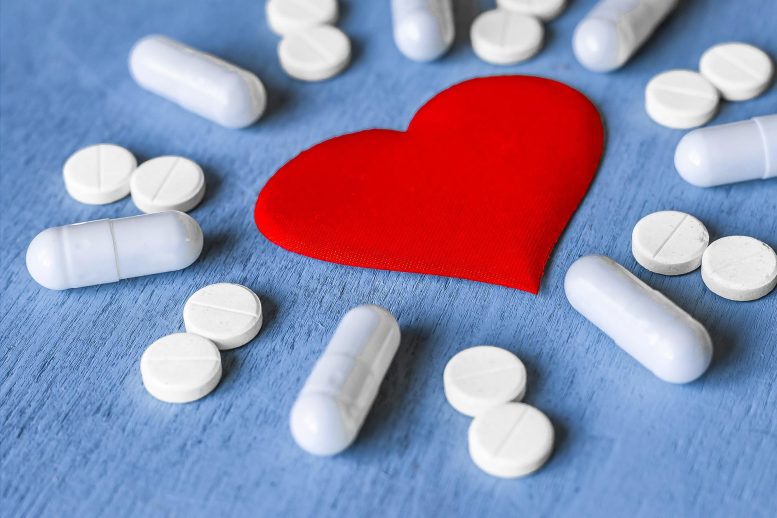

Over 80% of patients achieved control within a month, sustained at six months.
New triple-drug combination therapy GMRx2 has proven more effective than standard hypertension treatments, significantly lowering blood pressure in patients with uncontrolled hypertension. This could drastically reduce cardiovascular event risks and improve global health outcomes, especially in low- and middle-income countries.
New Hypertension Treatment Research
According to new research, a treatment plan based on a novel combination of low doses of three anti-hypertensive drugs in a single pill – known as GMRx2 – was superior to a high-quality standard care treatment plan at lowering blood pressure in patients with uncontrolled hypertension.[1]
Results of the ‘deliVERy of Optimal blood pressure coNtrol in afrICA (VERONICA)-Nigeria’ trial, led by The George Institute for Global Health, were presented today at the European Society of Cardiology Congress 2024 and simultaneously published in the Journal of the American Medical Association (JAMA).
Comparing GMRx2 to Standard Care
The GMRx2 treatment plan involved a once-daily pill containing telmisartan, amlodipine, and indapamide at a quarter, half, or standard doses. The standard care treatment plan recommended by the Nigerian Ministry of Health began with monotherapy, followed by dual and triple combination therapy, and was typical of hypertension guidelines for many countries.[2]
After 6 months of treatment, home systolic blood pressure was 31mmHg lower in the GMRx2 group compared to 26 mmHg lower with standard care – the 5.8 mmHg difference was highly clinically and statistically significant. Existing evidence shows that with every 5 mmHg reduction in systolic blood pressure, there is a 10% reduction in major cardiovascular events such as stroke, heart attack, and heart failure.[3]
After just one month, 81% of participants in the GMRx2 group achieved clinic-measured blood pressure control versus 55% with standard care. This improvement was sustained at six months with 82% achieving control, compared with 72% under standard care. The tolerability of both treatment plans was good, with no withdrawals due to adverse events.
High Effectiveness in Diverse Populations
Prof Dike Ojji, Head of the Cardiovascular Research Unit at the University of Abuja, Nigeria and study principal investigator said, “The triple pill still produced clinically meaningful reductions in blood pressure compared to standard care, even when standard care closely followed current guidelines and involved more clinic visits.”
“In low-income countries, fewer than one in four treated people achieve blood pressure control and in high-income settings, it is only between 50% and 70%,” added Prof Ojji, “so to see rates of over 80% in just one month is impressive.”
Potential Global Impact on Cardiovascular Health
It is estimated that over a billion adults live with hypertension worldwide, with two-thirds living in low- and middle-income countries.4 High blood pressure is the leading risk factor for mortality, accounting for 10.8 million deaths a year.[4,5] It is hoped this new treatment could have a big impact on reducing rates of cardiovascular disease, particularly in countries with the highest burden.
GMRx2 is the leading drug candidate of George Medicines, a late-stage, biopharmaceutical company addressing significant unmet need in the treatment of cardiometabolic disease, established to commercialise the research of The George Institute for Global Health. Earlier this month, GMRx2 was submitted to the US Food and Drug Administration (FDA) for the treatment of hypertension.
Positive Outcomes in Additional GMRx2 Trials
Phase III data from two additional GMRx2 trials were also presented at the congress, showing good tolerability and clinically relevant blood pressure reductions compared to placebo and dual combination therapy.[6,7]
Prof Anthony Rodgers, Senior Professorial Fellow at The George Institute and Chief Medical Officer at George Medicines said, “Our mission is to develop sustainable solutions that can improve the health of millions of people worldwide and alleviate strain on health systems. There is a global goal to reach 80% blood pressure control among those treated, but no country has yet achieved this. With the VERONICA trial, we’ve shown the potential of this novel strategy to reach this ambitious target.”
“There has been little innovation in this field, so it’s rewarding to see many years of research by The George Institute culminate in a novel treatment using established medicines to address an unmet need,” he added.
The VERONICA trial is funded by the Australian National Health and Medical Research Council.
References:
- “Low-Dose Triple-Pill vs Standard-Care Protocols for Hypertension Treatment in Nigeria: A Randomized Clinical Trial” by Dike B. Ojji, Abdul Salam, Mahmoud U. Sani, Okechukwu S. Ogah, Aletta E. Schutte, Mark D. Huffman, Rashmi Pant, Arpita Ghosh, Rupasvi Dhurjati, Josyula K. Lakshmi, Nanna. R. Ripiye, Ikechukwu A. Orji, Shehu A. Kana, Tijjani Abdussalam, Abdulgafar L. Olawumi, Isiaka M. Alfa, Olanike Allison Orimolade, Moses O. Ajayi and Anthony Rodgers, 31 August 2024, JAMA.
DOI: 10.1001/jama.2024.18080 - “Rationale for a New Low-Dose Triple Single Pill Combination for the Treatment of Hypertension” by Anthony Rodgers, Abdul Salam, William Cushman, Asita de Silva, Gian Luca Di Tanna, Sonali R. Gnanenthiran, Diederick Grobbee, Krzysztof Narkiewicz, Dike Ojji, Suzanne Oparil, Neil Poulter, Markus P. Schlaich, Aletta E. Schutte, Wilko Spiering, Bryan Williams, Jackson T. Wright and Paul Whelton, 14 February 2024, Global Heart.
DOI: 10.5334/gh.1283 - “Pharmacological blood pressure lowering for primary and secondary prevention of cardiovascular disease across different levels of blood pressure: an individual participant-level data meta-analysis” by Kazem Rahimi, Zeinab Bidel, Milad Nazarzadeh, Emma Copland, Dexter Canoy, Rema Ramakrishnan, Ana-Catarina Pinho-Gomes, Mark Woodward, Amanda Adler, Larry Agodoa, Ale Algra, Folkert W Asselbergs, Nigel S Beckett, Eivind Berge, Henry Black, Frank P J Brouwers, Morris Brown, Christopher J Bulpitt, Robert P Byington, William C Cushman, Jeffrey Cutler, Richard B Devereaux, Jamie Dwyer, Ray Estacio, Robert Fagard, Kim Fox, Tsuguya Fukui, Ajay K Gupta, Rury R Holman, Yutaka Imai, Masao Ishii, Stevo Julius, Yoshihiko Kanno, Sverre E Kjeldsen, John Kostis, Kizuku Kuramoto, Jan Lanke, Edmund Lewis, Julia B Lewis, Michel Lievre, Lars H Lindholm, Stephan Lueders, Stephen MacMahon, Giuseppe Mancia, Masunori Matsuzaki, Maria H Mehlum, Steven Nissen, Hiroshi Ogawa, Toshio Ogihara, Takayoshi Ohkubo, Christopher R Palmer, Anushka Patel, Marc Allan Pfeffer, Bertram Pitt, Neil R Poulter, Hiromi Rakugi, Gianpaolo Reboldi, Christopher Reid, Giuseppe Remuzzi, Piero Ruggenenti, Takao Saruta, Joachim Schrader, Robert Schrier, Peter Sever, Peter Sleight, Jan A Staessen, Hiromichi Suzuki, Lutgarde Thijs, Kenji Ueshima, Seiji Umemoto, Wiek H van Gilst, Paolo Verdecchia, Kristian Wachtell, Paul Whelton, Lindon Wing, Yoshiki Yui, Salim Yusuf, Alberto Zanchetti, Zhen-Yu Zhang, Craig Anderson, Colin Baigent, Barry Morton Brenner, Rory Collins, Dick de Zeeuw, Jacobus Lubsen, Ettore Malacco, Bruce Neal, Vlado Perkovic, Anthony Rodgers, Peter Rothwell, Gholamreza Salimi-Khorshidi, Johan Sundström, Fiona Turnbull, Giancarlo Viberti, Jiguang Wang, John Chalmers, Koon K Teo, Carl J Pepine and Barry R Davis, 1 May 2021, The Lancet.
DOI: 10.1016/S0140-6736(21)00590-0 - World Health Organization. Hypertension. 2023. Accessed August 2024. https://www.who.int/news-room/fact-sheets/detail/hypertension
- “Global burden of 87 risk factors in 204 countries and territories, 1990–2019: a systematic analysis for the Global Burden of Disease Study 2019” by Christopher J L Murray, Aleksandr Y Aravkin, Peng Zheng, Cristiana Abbafati, Kaja M Abbas, Mohsen Abbasi-Kangevari, Foad Abd-Allah, Ahmed Abdelalim, Mohammad Abdollahi, Ibrahim Abdollahpour, Kedir Hussein Abegaz, Hassan Abolhassani, Victor Aboyans, Lucas Guimarães Abreu, Michael R M Abrigo, Ahmed Abualhasan, Laith Jamal Abu-Raddad, Abdelrahman I Abushouk, Maryam Adabi, Victor Adekanmbi, Abiodun Moshood Adeoye, Olatunji O Adetokunboh, Davoud Adham, Shailesh M Advani, Gina Agarwal, Seyed Mohammad Kazem Aghamir, Anurag Agrawal, Tauseef Ahmad, Keivan Ahmadi, Mehdi Ahmadi, Hamid Ahmadieh, Muktar Beshir Ahmed, Temesgen Yihunie Akalu, Rufus Olusola Akinyemi, Tomi Akinyemiju, Blessing Akombi, Chisom Joyqueenet Akunna, Fares Alahdab, Ziyad Al-Aly, Khurshid Alam, Samiah Alam, Tahiya Alam, Fahad Mashhour Alanezi, Turki M Alanzi, Biresaw wassihun Alemu, Khalid F Alhabib, Muhammad Ali, Saqib Ali, Gianfranco Alicandro, Cyrus Alinia, Vahid Alipour, Hesam Alizade, Syed Mohamed Aljunid, François Alla, Peter Allebeck, Amir Almasi-Hashiani, Hesham M Al-Mekhlafi, Jordi Alonso, Khalid A Altirkawi, Mostafa Amini-Rarani, Fatemeh Amiri, Dickson A Amugsi, Robert Ancuceanu, Deanna Anderlini, Jason A Anderson, Catalina Liliana Andrei, Tudorel Andrei, Colin Angus, Mina Anjomshoa, Fereshteh Ansari, Alireza Ansari-Moghaddam, Ippazio Cosimo Antonazzo, Carl Abelardo T Antonio, Catherine M Antony, Ernoiz Antriyandarti, Davood Anvari, Razique Anwer, Seth Christopher Yaw Appiah, Jalal Arabloo, Morteza Arab-Zozani, Filippo Ariani, Bahram Armoon, Johan Ärnlöv, Afsaneh Arzani, Mehran Asadi-Aliabadi, Ali A Asadi-Pooya, Charlie Ashbaugh, Michael Assmus, Zahra Atafar, Desta Debalkie Atnafu, Maha Moh’d Wahbi Atout, Floriane Ausloos, Marcel Ausloos, Beatriz Paulina Ayala Quintanilla, Getinet Ayano, Martin Amogre Ayanore, Samad Azari, Ghasem Azarian, Zelalem Nigussie Azene, Alaa Badawi, Ashish D Badiye, Mohammad Amin Bahrami, Mohammad Hossein Bakhshaei, Ahad Bakhtiari, Shankar M Bakkannavar, Alberto Baldasseroni, Kylie Ball, Shoshana H Ballew, Daniela Balzi, Maciej Banach, Srikanta K Banerjee, Agegnehu Bante Bante, Adhanom Gebreegziabher Baraki, Suzanne Lyn Barker-Collo, Till Winfried Bärnighausen, Lope H Barrero, Celine M Barthelemy, Lingkan Barua, Sanjay Basu, Bernhard T Baune, Mohsen Bayati, Jacob S Becker, Neeraj Bedi, Ettore Beghi, Yannick Béjot, Michellr L Bell, Fiona B Bennitt, Isabela M Bensenor, Kidanemaryam Berhe, Adam E Berman, Akshaya Srikanth Bhagavathula, Reshmi Bhageerathy, Neeraj Bhala, Dinesh Bhandari, Krittika Bhattacharyya, Zulfiqar A Bhutta, Ali Bijani, Boris Bikbov, Muhammad Shahdaat Bin Sayeed, Antonio Biondi, Binyam Minuye Birihane, Catherine Bisignano, Raaj Kishore Biswas, Helen Bitew, Somayeh Bohlouli, Mehdi Bohluli, Alexandra S Boon-Dooley, Guilherme Borges, Antonio Maria Borzì, Shiva Borzouei, Cristina Bosetti, Soufiane Boufous, Dejana Braithwaite, Nicholas J K Breitborde, Susanne Breitner, Hermann Brenner, Paul Svitil Briant, Andrey Nikolaevich Briko, Nikolay Ivanovich Briko, Gabrielle B Britton, Dana Bryazka, Blair R Bumgarner, Katrin Burkart, Richard Thomas Burnett, Sharath Burugina Nagaraja, Zahid A Butt, … , Simon Yadgir, Seyed Hossein Yahyazadeh Jabbari, Kazumasa Yamagishi, Mousa Yaminfirooz, Yuichiro Yano, Sanni Yaya, Vahid Yazdi-Feyzabadi, Tomas Y Yeheyis, Christopher Sabo Yilgwan, Mekdes Tigistu Yilma, Paul Yip, Naohiro Yonemoto, Mustafa Z Younis, Theodore Patrick Younker, Bahman Yousefi, Zabihollah Yousefi, Taraneh Yousefinezhadi, Abdilahi Yousuf Yousuf, Chuanhua Yu, Hasan Yusefzadeh, Telma Zahirian Moghadam, Mohammad Zamani, Maryam Zamanian, Hamed Zandian, Mikhail Sergeevich Zastrozhin, Yunquan Zhang, Zhi-Jiang Zhang, Jeff T Zhao, Xiu-Ju George Zhao, Yingxi Zhao, Maigeng Zhou, Arash Ziapour, Stephanie R M Zimsen, Michael Brauer, Ashkan Afshin and Stephen S Lim, 17 October 2020, The Lancet.
DOI: 10.1016/S0140-6736(20)30752-2 - “Efficacy and Safety of a Novel Low-Dose Triple Single-Pill Combination Compared With Placebo for Initial Treatment of Hypertension” by Anthony Rodgers, Abdul Salam, Aletta E. Schutte, William C. Cushman, H. Asita de Silva, Gian Luca Di Tanna, Diederick Grobbee, Krzysztof Narkiewicz, Dike B. Ojji, Neil R. Poulter, Markus P. Schlaich, Suzanne Oparil, Wilko Spiering, Bryan Williams, Jackson T. Wright, Alexis Gutierez, Aliu Sanni, Poopalan Lakshman, Deirdre McMullen, Gotabhaya Ranasinghe and Paul Whelton, 31 August 2024, Journal of the American College of Cardiology.
DOI: 10.1016/j.jacc.2024.08.025 - “Triple single pill combination of telmisartan/amlodipine/indapamide vs dual combinations for hypertension” by Rodgers A, Salam A et al., (In Press) 2024.